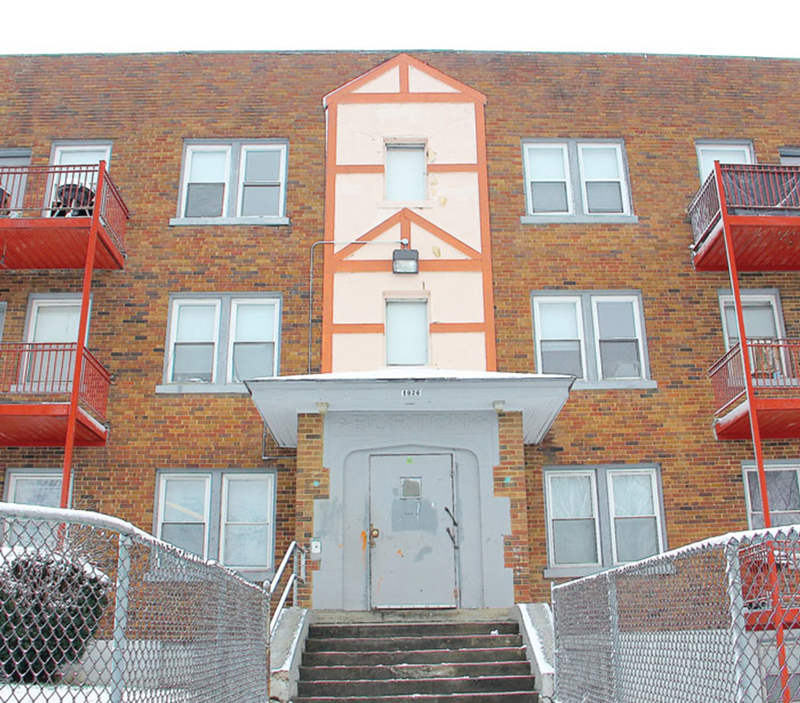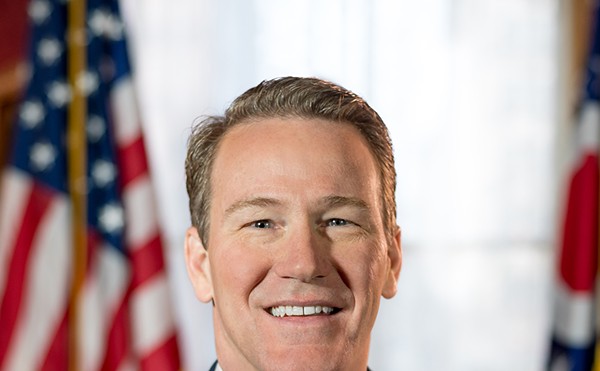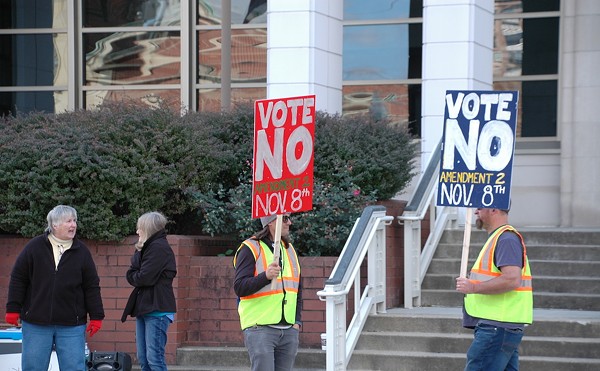It was still dark the morning of Nov. 6 when a persistent, pounding rain caused a portion of the roof to collapse at the Burton Apartments in Avondale. The failure sent water streaming all the way down to the first floor of the three-story building, caused the collapse of internal ceilings and forced the evacuation of the hulking building’s 25 occupied units as water poured into them.
Some of the building’s residents waited in the cold for a Metro bus to take them to nearby Hirsch Recreation Center, where they hunkered down until rooms could be secured at a Days Inn. The 70 people who lived in the Burton stayed in the hotel for a week, first at the expense of their landlords PF Holdings, LLC, and then with the city temporarily picking up the tab to the tune of $7,000.
It wasn’t the first time PF Holdings, owned by the New Jersey-based Puretz family, has drawn attention from the city. Nor is PF Holdings the only culprit when it comes to shoddy housing for low-income tenants. City officials are promising to crack down on landlords who get millions of dollars from the Department of Housing and Urban Development to house low-income renters but seem to spend little of that money on their properties. These landlords are concentrated in the city’s low-income neighborhoods like Avondale, Walnut Hills and Price Hill, where tenants facing a historic shortage of low-cost housing find few other options.
A Jan. 29 court date looms for PF Holdings. At that hearing, a Hamilton County judge will decide whether to honor a city request to take control of some of the group’s dozen buildings in the city and place them in the hands of a receiver to do repairs.
The change would be a long time coming.
Last March, tenants at the Puretz-owned Alms Apartments in Walnut Hills organized to demand better living conditions there, saying bed bugs, leaks, heat and plumbing dysfunctions and other problems made the building a miserable place to live. They also said property managers responded to their complaints with intimidation.
“I’ve been living here for three years, and three winters have gone by where I didn’t have any heat,” said resident Nicole Thornton in March. “When the new people bought the building, they said [they would fix things]. The most they’ve done that I can see is put tint on the windows. How is that helping me and my kids?”
PF Holdings is relatively new in Cincinnati, but has racked up quite a record in its three years here. In 2013, the company, using a number of LLC names, purchased a dozen buildings here occupied by nearly 1,000 mostly Section 8 tenants. That’s meant about $5 million annually for the group from the federal government. During that time, the buildings owned by the company have also incurred thousands of municipal code violations — more than 1,800 at the Burton alone.
The group isn’t the only one with a large number of code violations, though. Across neighborhoods like Avondale, Price Hill and Walnut Hills, landlords at some multi-family buildings take federal money for Section 8 tenants but do little to provide appropriate living conditions. Some of it has to do with the city’s aging housing stock and the cost of taking care of large properties. Some of the neglect, however, is criminal.
In September, a West Price Hill landlord named Bryan Germany spent more than 60 days in jail for building code violations related to his rental properties. One of those buildings was eventually condemned and torn down.
That level of action has been rare, however, and the conditions of many affordable housing units have deteriorated in places like Avondale and West Price Hill, which each have around 300 properties with municipal code violations on the books. Walnut Hills, where the Alms building is located, has another 160 properties with violations. Many of those buildings house low-income renters.
Meanwhile, those tenants face few other choices in terms of places to live as rents have risen 20 percent over the last five years across the city. Meanwhile, the city’s low-income housing stock has decreased, and the wages paid to many workers haven’t kept up with that increase. A study by the Greater Cincinnati Coalition for the Homeless found that in order to comfortably afford a two-bedroom apartment at the $769 average monthly rate in Hamilton County, a minimum-wage worker would have to work 73 hours a week.
Federal guidelines say housing should cost no more than 30 percent of a household’s monthly income. However, 11 million people in the U.S. pay more than 50 percent of their income for housing, and that’s expected to swell in the coming years as rental markets across the country continue to heat up.
Locally, the Homeless Coalition has worked with Cincinnati Legal Aid to help tenants at places like the Alms and the Burton organize to demand better upkeep of buildings that are vital parts of Cincinnati’s affordable housing stock (see “United Front,” CityBeat issue of March 25, 2015).
But sometimes landlords push back. Attorneys for PF Holdings have said tenant complaints are often exaggerated and that some of the legitimate ones at the Alms and other buildings involved a now-fired property manager. They contend that the group has spent hundreds of thousands of dollars in upkeep and maintenance on buildings like the Burton and, in statements to the media, that the roof collapse there was an unavoidable “act of nature” caused by a “100-year rain.”
But city records tell a different story. Just days before the roof collapse there, on Oct. 28, city inspectors cited the company for roof problems at the Burton. Records show that those issues were caused by leaf and other debris buildup on the roof, which allowed water to collect there and slowly undermine its structure.
Now, officials at the city and federal level are stepping up their efforts to hold landlords like PF Holdings accountable.
Cincinnati City Council members have called for new measures to be taken to combat negligent landlords in the city, including proposals for a special housing court that would deal with code violations. Last month, the city declared the buildings held by PF Holdings public nuisances. Cincinnati Assistant City Solicitor Mark Manning says the city conducted exhaustive inspections of properties held by the company and found more than 1,300 code violations.
“The owners knew for months that we were coming to do these inspections, and that was the condition of the properties when we came to do them,” Manning said. “Things were a mess on most of the properties.”
At the company’s hearing in Hamilton County court later this month, a judge will decide whether to hand over management of six of the group’s Cincinnati buildings — and the millions in Department of Housing and Urban Development funding that comes with them — to the financial institutions holding mortgages on them. The city will also recommend an independent receiver to handle that money and make needed improvements if the bank does not step in.
“My motto up here is, ‘Don’t own a building you wouldn’t sleep in,’ Councilwoman Yvette Simpson said at a Jan. 4 Cincinnati City Council Law and Public Safety Committee meeting. “I know, because I’ve been through two of the buildings, that there’s no way the owners are going to sleep there. It’s inhumane for people to live that way. It’s a horrible set of circumstances.”
The incidents at the Alms, the Burton and elsewhere have also gotten the attention of HUD, though that took some time. The agency has been slow to react to the problem, city officials say. But at a Dec. 16 hearing in Hamilton County Courts, officials from HUD testified about their inspections of some of the properties, telling a judge they found terrible conditions. U.S. Sens. Rob Portman and Sherrod Brown flagged the case with the federal agency.
In the meantime, elected officials say they’re working to improve conditions for low-income tenants across the city.
“This is one of many,” Law and Public Safety Chairman Christopher Smitherman said of negligent landlords like PF Holdings. “So residents listening to this, understand that we do have a strategy. Landlords who aren’t managing their properties should take this as a sign that we’re coming.” ©






